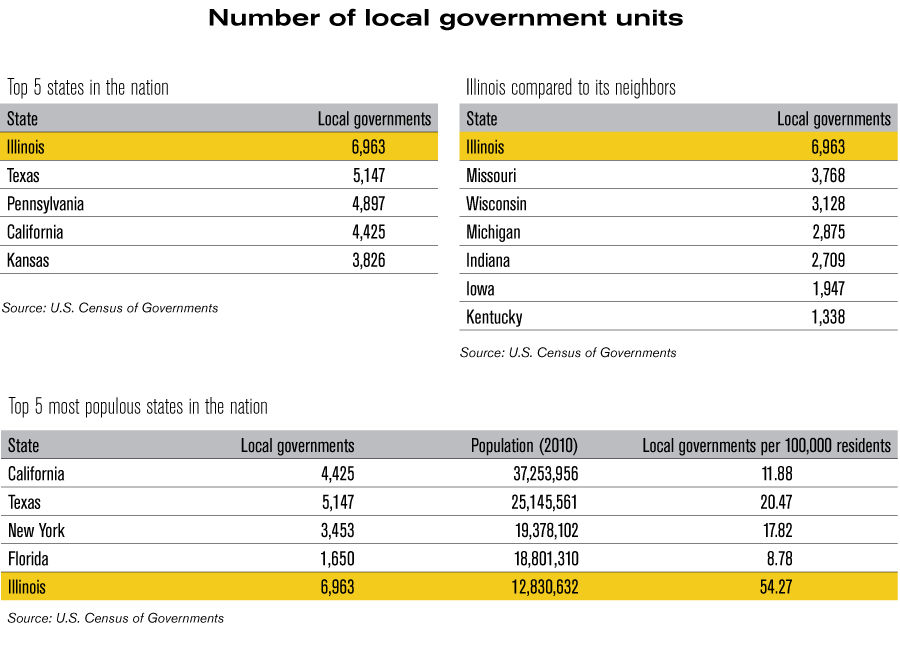THE PROBLEM
Illinoisans suffer from the second-highest property tax rates in the nation.
Their state is the third most corrupt in the nation.
And driving this expensive and corrupt reality on the local level is the fact that Illinois has more units of local government than any other state in the nation. With 6,963 units of local government, Illinois beats its nearest competitor by more than 1,800.
Illinois is a large state, but its size and population don’t account for its high number of local government entities. Florida, which is larger than Illinois, has far fewer units of local government, with just 1,650. And Illinois has more layers of general purpose local government than any other state in the country. Sixty one percent of the state’s residents live under three layers of general purpose local government (municipal, township or county governments); in 40 other states, residents never have more than two layers.
This doesn’t include special districts, such as libraries, parks, forest preserve, fire protection, sanitation, transportation and even mosquito abatement districts. In fact, in some areas of Illinois, citizens have up to 16 different local government agencies operating in their area.
When citizens live in areas with too many layers of government, their ability to participate in the democratic process becomes more difficult, and the public overall isn’t able to actively participate and wholly impossible for citizens to organize efforts to reduce the number of local governments in Illinois. For example, to eliminate townships in Illinois voters must get a petition signed by 10 percent of the registered voters in each township of the county. Then, a binding referendum question can go on the ballot. All of this must be done in less than 90 days.
This means it’s more difficult to consolidate local government than it is to amend the Illinois Constitution, which only requires about 4 percent of registered voters to sign a petition over a period of 540 days to get an amendment on the ballot.
THE SOLUTION
Taxpayers shouldn’t be supporting multiple – and often redundant – layers of government through ever-higher property taxes. The state of Illinois must create more reasonable pathways for citizens to consolidate local government.
Increased government consolidation can happen in three different ways:
- Citizen-initiated referendum
- Legislative-initiated referendum
- Elimination of unelected “dependent” government
The process to consolidate or eliminate local governments in Illinois should be no harder than the process to amend the Illinois Constitution via referendum. State laws need to be revised to reflect this.
Taxpayers should not be on the hook for multiple layers of government that duplicate services and allow local governments to borrow and spend more. By eliminating redundancies and introducing efficiencies, consolidations of local government can save taxpayers money.
Local government consolidation can also help fight corruption and increase public participation in the democratic process.
When government is complex and convoluted, it is difficult for citizens to actively participate in the decision-making processes that affect their daily lives.
Consolidating and simplifying local government will increase participation in the democratic process and create opportunities for citizens to fight corruption and end wasteful spending.

